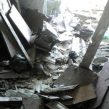
Six Suspected Rebels Killed in Kabardino-Balkaria
Publication: Eurasia Daily Monitor Volume: 12 Issue: 140
By:

On July 23, government forces declared a counterterrorist operation regime and launched a special operation in the center of Nalchik, Kabardino-Balkaria. According to the Russian National Antiterrorist Committee (NAK), the authorities learned about the presence of six suspected members of a terrorist group in a nine-story apartment block and decided to disrupt their activities at 3 a.m. The suspected militants reportedly were planning terrorist attacks in the republic. Over 200 civilians were evacuated from the apartment building to ensure their safety, according to the NAK. After the government forces sealed off the area, they called on the suspects to lay down their weapons and surrender. Instead, the suspects put up “fierce resistance,” and all six were killed by the security forces (Nac.gov.ru, July 23).
The account of relatives of the suspected insurgents differs quite substantially from the official version. Yevgenia Kugotova, a relative of Marat Dotkulov, one of the slain suspects, told the Kavkazskaya Politika website that Dotkulov had disappeared two months earlier and telephoned his mother only on July 23—“most likely to say farewell,” as Kugotova put it. “Marat said that the government forces welded the apartment’s door [shut] and fired on them, even though they did not have weapons. Marat and his mother were talking on the telephone until 7 a.m., when the last large explosion was heard,” she said. “After that, Marat stopped being accessible via telephone.” Parents of the surrounded suspects approached the security forces, asking that they be allowed to negotiate with their children, but were not allowed to do so (Kavkazskaya Politika, July 25).
According to the NAK, one of the slain rebels, 22-year-old Sultan Abshaev (a.k.a. Seifulla), was responsible for the July 14 murder of 35-year-old Marat Tokov, an officer of Kabardino-Balkaria’s prosecutor general. Abshaev reportedly had been on the police’s wanted list for more than two years. Police sources said the suspected rebels unsuccessfully tried to flee the scene of the special operation. According to the police, the rebels had a large cache of weapons and a lab for producing explosive materials (Kommersant, July 24).
Citing eyewitnesses, the Kavkazsky Uzel website reported that relatives of the rebels were allowed to talk to the surrounded rebels, but the latter refused to surrender. Apart from Marat Dotkulov and Sultan Abshaev, four others were killed in the apartment—Amir Kazberigev, Murat Bogotov, Aslan Bogotov and the owner of the apartment, Murat Misrokov. The latter was a doctor at the local hospital. The rebels barricaded themselves in Misrokov’s apartment on the sixth floor. During the special operation, the apartment itself and several others around it were destroyed (Kavkazsky Uzel, July 24).
A brief video of the special operation in Nalchik does not show particularly fierce fighting (YouTube, July 23). Even Nadezhda Kevorkova, a journalist with RT and a staunch critic of the West, called the special operation in Nalchik “a cold-blooded and cynical action with the murder of six people in a residential multi-story apartment building” (Kavkazskaya Politika, July 24). Further, Kevorkova cited another Russian expert on the North Caucasus, Irina Starodubrovskaya, who said that the human rights situation in Kabardino-Balkaria is the worst in the region because people are completely helpless when they are targeted by the police. Normally, any practicing Muslim can become the target of what appears to be a government campaign of harassment, intimidation and killings (Kavkazskaya Politika, July 25).
Given these adverse conditions at home, some Circassian Muslims have chosen to travel to the Middle East to fight for the Islamic State (IS) organization. Still Circassians do not comprise a large force among the IS fighters. According to some sources, up to 100 young people from three Circassian-populated republics—Adygea, Kabardino-Balkaria and Karachaevo-Cherkessia—have traveled to the Middle East in the past year. Some of them may have had no choice but to leave, because the undeclared war at home is much more dangerous for them than the open war in the Middle East. Circassians have also traveled to the Middle East to help their brethren among the Syrian refugees. One such Circassian activist, Nartan Kilic, who visited a Syrian refugee camp in Turkey, was killed in an IS suicide bomb attack in July. Kilic’s mother also died and his sister was wounded in the attack (Onkavkaz.com, July 22).
The recent spike in violence in Kabardino-Balkaria is quite unexpected because the security situation in the republic seemed to be improving. Apparently, the security situation there is either cyclical or the spike in violence was politically motivated. Most of the current rebel violence in the republic is related to government operations against suspected insurgents, who have only launched a handful of attacks. So, the government forces’ unusually high activity may be designed to undermine the republican leadership’s authority. It is even unclear whether Kabardino-Balkarian rebels have taken an oath of allegiance to the Islamic State along with other rebels of the region or have remained within the Caucasus Emirate. The NAK was quick to designate the six slain suspected rebels as members of IS in the North Caucasus. The North Caucasus rebels’ turn toward the Islamic State has presented Moscow with a great opportunity to cast itself as an ally of the West in the fight against IS.




